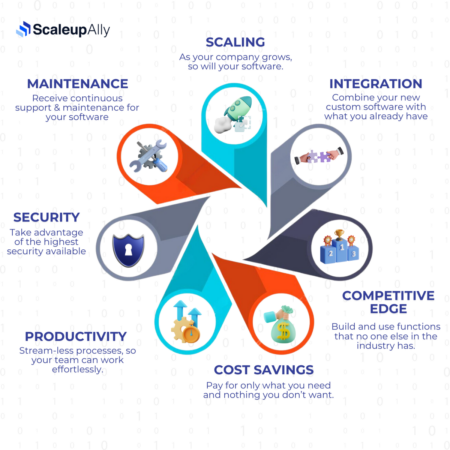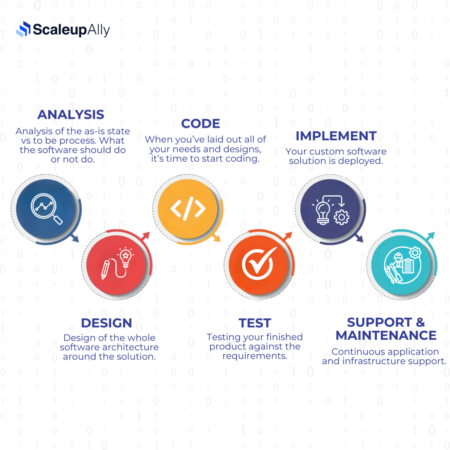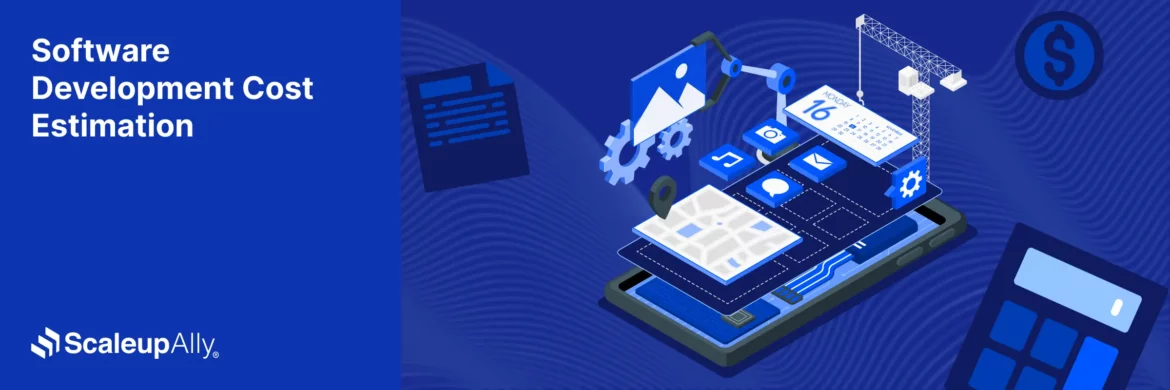
How Niche Leaders Use Custom Software for Superior Performance?
Suprabhat Sen | May 6, 2024 , 9 min read
Table Of Content
The business world is highly competitive, compelling companies to stay ahead of the curve by keeping up with the latest technological advancements. One way niche leaders are doing this is by developing custom software solutions tailored to their unique needs. This blog post will explore how niche leaders use custom software to gain a competitive edge and drive success.
Custom software has numerous benefits and can have a significant impact on a business’s bottom line. So, let’s get started and take a closer look at how niche leaders use custom software.
Key Takeaways
- Custom software empowers niche leaders by addressing unique business needs that generic solutions cannot fulfill.
- Automating processes through tailored software reduces errors, increases efficiency, and allows focus on core competencies.
- Personalized software solutions enhance customer experience, fostering loyalty, satisfaction, and stronger market positioning.
- Data-driven insights from custom software enable informed decisions, optimized strategies, and targeted product development.
- Custom solutions improve internal collaboration, streamline communication, and support seamless operations in dynamic business environments.
What Makes a Niche Leader?
A niche leader is a company that has established a dominant position in a specific market segment. These companies have a deep understanding of their target audience and unique needs, allowing them to create products and services tailored to their customers’ specific requirements. Niche leaders are known for their expertise, innovation, and ability to stay ahead of the curve in their respective industries.
Characteristics Of a Niche Leader
There are several characteristics that set niche leaders apart from their competitors. These include:
1. Expertise
Niche leaders have a deep understanding of their industry and target audience. They have honed their skills, knowledge, and experience to create products and services that meet their customers’ specific needs.
2. Innovation
Niche leaders are always looking for ways to bring innovatiton and unique touch points in their products and services. They are not afraid to take risks and try new things to stay ahead of the competition.
3. Customer focus
Niche leaders prioritize their customers’ needs and work to provide them with the best possible experience. They listen to feedback and make changes accordingly, ensuring that their customers are always satisfied.
Why Niche Leaders Need Custom Software?
Niche leaders need custom software to gain a competitive edge and drive success. Here are a few reasons why custom software is essential for niche leaders:
1. Unique Business Needs
Niche leaders have unique business needs that off-the-shelf software cannot address. Custom software solutions can be tailored to meet specific requirements, making them more effective than generic software.
2. Streamlined Processes
Custom software can automate time-consuming processes, reduce errors, and increase efficiency. This allows niche leaders to focus on their core competencies, enabling them to achieve growth and success.
3. Improved Customer Experience
Custom software can be designed to enhance the customer experience by providing personalized solutions that meet their specific needs. This can lead to increased customer loyalty and satisfaction.

Custom Software As a Strategic Tool
Custom software is no longer just a tool for streamlining processes or improving customer experience. It has become a strategic tool for niche leaders to gain a competitive advantage and drive success. By investing in custom software solutions, niche leaders can not only meet their unique business needs but also capitalize on emerging opportunities.
1. Provide Niche Leaders With Valuable Insights
Custom software can be designed to provide niche leaders with valuable insights into their target audience’s behavior, preferences, and pain points. With this information, they can make data-driven decisions, develop effective marketing strategies, and create products and services that meet their customers’ specific needs.
2. Staying Ahead of the Curve
Moreover, custom software can help niche leaders stay ahead of the curve by enabling them to quickly adapt to changing market conditions. They can easily integrate new features, functionalities, and technologies into their software solutions, ensuring that they are always up-to-date and relevant.
3. Collaborative Tool
In addition to this, custom software can also serve as a tool for collaboration and communication within the organization. It can improve team productivity, facilitate better decision-making, and enable remote work, ensuring that niche leaders can operate seamlessly in a fast-paced and dynamic business environment.
Examples Of Custom Software Being Successfully Implemented
Let’s explore some examples of custom software being successfully implemented by companies across different industries. These examples will showcase the ways in which custom software can transform businesses and drive success.
1. Vijay Construction
Vijay Construction is a well-known infrastructure services provider based in Malaysia. They specialize in constructing viaducts, flyovers, metros, bridges, pipelines, roads, ports, and more. To efficiently manage their diverse range of infrastructure projects, Vijay Construction initiated the development of custom software. Their main objective was to track the progress of ongoing projects.
With the help of custom software, Vijay Construction was able to successfully track the status of its various infrastructure projects, simplifying its project reporting process. Read further on their Case Study
2. Bourke Group
Bourke Group is a regional firm based in Australia, founded in 1993 in Cobram, Victoria. It specializes in providing financial advisory services such as Wealth Management, Accounting, Tax, Corporate Advisory, and an exceptional virtual CFO service. Bourke Group has helped many clients build, scale, and exit profitable businesses while prioritizing the management of personal and family implications during major events.
Bourke Group leveraged Custom Software to overcome data challenges and unlock unprecedented insights. The implementation of data refresh automation streamlined operations, ensuring up-to-date information. This enabled Bourke Group to achieve data-driven decision-making and tailored reporting for each client, positioning them as a leader in the financial advisory space. As a result, they can guide clients on a path to sustained success. Learn more about how they were able to achieve this.
Main Challenges Of Custom Niche Software
While custom software can provide numerous benefits to niche leaders, there are also several challenges that come with its development and implementation. Let’s take a look at some of the main challenges associated with custom niche software:
1. Time and Cost
Developing custom software can be time-consuming and expensive. Niche leaders must allocate the necessary time and resources to ensure that the software meets their unique requirements.
2. Talent Acquisition
Finding the right talent to develop and implement custom software can be a challenge. Niche leaders need to have a team of skilled developers who understand their industry and can create software that meets their specific needs.
3. Maintenance and Upgrades
Custom software requires regular maintenance and upgrades to ensure that it remains relevant and effective. Niche leaders must be prepared to invest in ongoing maintenance and upgrades to keep their software up-to-date and secure.
While custom niche software can provide significant benefits to niche leaders, it also presents several challenges that must be considered and addressed. By understanding these challenges and taking the necessary steps to overcome them, niche leaders can leverage custom software to become first movers in their industry and drive innovation.
Acquiring Custom Software
Here are a few steps to guide you acquire custom software for your business:
1. Identify Your Business Needs
The first step in acquiring custom software is to identify your business needs.
- What are the pain points that your business is facing?
- What processes do you want to streamline?
- What are your goals for acquiring custom software?
For example, are you struggling with inefficient communication between teams, or perhaps your current software solutions are outdated and no longer meet your needs?
Once you have a clear understanding of your business needs, you can start looking for software developers who can create a solution that meets your specific requirements.
2. Choose the Right Software Developer
Choosing the right software developer is crucial to the success of your custom software project. Look for developers who have experience in your industry and have a proven track record of delivering high-quality solutions. Check their portfolio and read reviews from previous clients to get an idea of their expertise and reliability.
When it comes to choosing a reliable software developer partner, ScaleupAlly is a top contender. With years of experience in the industry, we have a proven track record of delivering high-quality solutions to clients across various domains. Our portfolio speaks volumes about their expertise, and our clients’ reviews attest to our reliability and commitment to delivering excellent results. So, if you’re looking for a dependable partner for your custom software project, ScaleupAlly is definitely worth considering.
3. Define the Scope of Your Project
Once you’ve chosen a software developer, define the scope of your project. This includes outlining the features and functionalities you want in your custom software, as well as the timeline and budget for the project. Be as specific as possible to ensure that you and the developer are on the same page.
4. Collaborate with the Software Developer
Collaboration is key to the success of any custom software project. Work closely with the software developer to ensure that the solution meets your business needs. Provide feedback at every stage of the project to ensure that the final product is exactly what you envisioned.
5. Test and Deploy the Software
Before deploying the software, test it thoroughly to ensure that it meets your business needs and works as intended. Train your employees on how to use the software and provide them with ongoing support to ensure that they can use it effectively.

Conclusion
The benefits of custom software, such as tailored solutions, streamlined processes, improved customer experience, and valuable insights, make it a strategic tool for businesses. As seen in the successful implementation of custom software by companies such as Vijay Construction, the impact of custom software on businesses can be transformative. If you are a niche leader looking to take your business to the next level, contact ScaleupAlly for a customized software solution that meets your unique business needs and drives success.
Related Blogs

Top 20 Emerging Technologies of 2026
Discover the top 20 emerging technologies of 2026. Explore which innovations are driving change across healthcare, finance, manufacturing, and other crucial industries.
ScaleupAlly Team
Dec 16 ,
9 min read

Software Development Timeline: Phases, Duration & Estimation Guide
Understand the software development timeline with phase durations, key factors, hidden delays, and practical methods to estimate project time.
Suprabhat Sen
Nov 29 ,
16 min read

Software Development Cost Estimation Guide: What’s Included & What Affects the Price
Explore software development cost components, major pricing factors, and practical estimation methods to plan your project accurately from start to finish.
Suprabhat Sen
Nov 29 ,
14 min read


